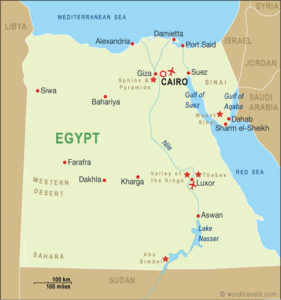US-Egypt relations in turmoil: ‘Entire Middle East could suffer’
Daily News Article — Posted on October 18, 2013
 (from Reuters at the New York Post) – Relations between the United States and Egypt are now in turmoil and the entire Middle East could suffer, the Egyptian foreign minister said in remarks made a week after Washington moved to curtail military aid to Cairo.
(from Reuters at the New York Post) – Relations between the United States and Egypt are now in turmoil and the entire Middle East could suffer, the Egyptian foreign minister said in remarks made a week after Washington moved to curtail military aid to Cairo.
Nabil Fahmy told state-run Al-Ahram newspaper that Egypt had been dependent on US aid for too long but Washington was wrong to assume the Cairo government would always follow its line.
“We are now in a delicate state reflecting the turmoil in the relationship and anyone who says otherwise is not speaking honestly,” he said in comments published on Wednesday.
US officials said the aid cut reflected Washington’s unhappiness with Egypt’s path since the army overthrew freely-elected [Islamist] President Mohamed Morsi of the Muslim Brotherhood on July 3 [following massive, prolonged protests by millions of Egyptians over Morsi’s abuse of power].
Egypt has already criticized the decision and suggested it could turn to other countries for military aid, possibly Russia.
 Egyptian security forces have cracked down hard on Islamists since the army seized power, killing hundreds and arresting thousands, including Morsi and other leaders accused of inciting or carrying out violence.
Egyptian security forces have cracked down hard on Islamists since the army seized power, killing hundreds and arresting thousands, including Morsi and other leaders accused of inciting or carrying out violence.
Muslim Brotherhood leaders say they face more severe repression than under veteran autocrat Hosni Mubarak, who was toppled by a popular uprising in 2011. The army-backed government calls the Brotherhood terrorists. …
Egypt has long been the second-largest recipient of US aid after Israel and its military – the largest in the Arab world – has worked closely with Washington for decades.
The United States now faces a policy dilemma – how to promote democracy while not alienating an Arab ally which has a peace treaty with Israel and controls the strategic Suez Canal.
Fahmy said an extended period of instability in ties would “reflect negatively on the entire region, including American interests”.
The current situation was not solely the result of the US decision to withhold aid, he said.
“The truth is that the problem goes back much earlier, and is caused by the dependence of Egypt on the US aid for 30 years. (The aid) made us choose the easy option and not diversify our options,” he said.
The long-standing military relationship caused Washington to wrongly assume that Egypt would always go along with its policies and goals, Fahmy said.
TURN TO RUSSIA?
Most worrying for the United States is the possibility that the army will turn to a rival country for military aid.
Egypt’s army is exploring its options. Military sources told Reuters last week that the army is planning to diversify its source of weapons, including a possible turn to Russia.
The government has insisted Egypt would not bow to US pressure, saying it found American policy strange at a time when the country was facing what it calls a war against terrorism.
US military aid to Cairo, put at $1.3 billion a year, was [established because] of the 1979 peace treaty between Egypt and Israel.
The US State Department made clear it was not cutting off all aid and would continue military support for counterterrorism and security in the Sinai, bordering Israel, where al Qaeda-inspired militants have stepped up attacks on soldiers and police since Mursi’s overthrow.
Egypt’s Western allies had been trying to persuade the government and the Muslim Brotherhood to engage in an inclusive political process, but neither side demonstrated enough flexibility to ease the crisis.
Reprinted here for educational purposes only. May not be reproduced on other websites without permission from The New York Post.
Background
MOHAMED MORSI:
- Mohamed Morsi was the fifth President of Egypt, having assumed office June 30, 2012.
- Educated in the U.S., Morsi was a Member of Parliament in the People’s Assembly of Egypt from 2000 to 2005 and a leading figure in the Muslim Brotherhood.
- Morsi became Chairman of the Freedom and Justice Party (FJP) when it was founded by the Muslim Brotherhood in the wake of the 2011 Egyptian revolution.
- He ran as the FJP’s candidate for the May-June 2012 presidential election.
- On June 24, 2012, the election commission announced that Morsi won Egypt’s presidential runoff against Ahmed Shafik, the last prime minister under deposed leader Hosni Mubarak.
- According to official results, Morsi took 51.7 percent of the vote while Shafik received 48.3.
- Morsi resigned from his position as the head of the Muslim Brotherhood’s FJP after his victory was announced.
- He is the first civilian to hold the office, and the first chosen in a contested election with direct universal suffrage.
- Morsi pushed through a constitution in Dec. 2012 that was enshrined in Islamic [Sharia] law. Hundreds of thousands of Egyptians protested its passage. (from wikipedia)
EGYPT’S MUSLIM BROTHERHOOD:
- A widespread Islamist organization founded in 1928, the Brotherhood seeks to Islamize societies from the ground up and compel governments in Muslim countries to adhere to sharia, or Islamic law.
- At various times in its history, the group has used or supported violence and has been repeatedly banned in Egypt for attempting to overthrow Cairo’s secular government.
- Since the 1970s, however, the Egyptian Brotherhood has disavowed violence and sought to participate in Egyptian politics. The U.S. State Department does not include the group on its list of terrorist organizations.
- Still, [under 30 year ruler Hosni Mubarak], the Egyptian government mistrusted the Brotherhood’s pledge of nonviolence and [banned] the organization.
- One reason the Brotherhood’s commitment to nonviolence is unclear: The original Egyptian organization has spawned branches in 70 countries. These organizations bear the Brotherhood name, but their connections to the founding group vary and some of them may provide financial, logistical, or other support to terrorist organizations.
- Some terrorist groups-including Hamas, Jamaat al-Islamiyya, and al-Qaeda-have historic and ideological affiliations with the Egyptian Brotherhood.
- In addition, some of the world’s most dangerous terrorists were once Egyptian Muslim Brotherhood members, including Osama bin Laden’s top deputy Ayman al-Zawahiri. The organization is like a “stepping stone,” says Evan Kohlmann, an international terrorism consultant. (from cfr.org/publication/9248/does_the_muslim_brotherhood_have_ties_to_terrorism.html)
US FINANCIAL AID TO EGYPT:
How much does the U.S. spend on Egypt?
Egypt receives more U.S. aid than any country except for Israel, Afghanistan, Pakistan and Iraq.
The exact amount varies from year to year and there are many different funding streams, but U.S. foreign assistance to Egypt has averaged about $2 billion a year since 1979, when Egypt struck a peace treaty with Israel. Most of that goes toward military aid. President Obama’s 2014 budget tentatively included $1.55 billion in aid, about the same amount the U.S. has sent in recent years.
READ MORE AT: propublica.org/blog/item/f.a.q.-on-u.s.-aid-to-egypt-where-does-the-money-go-who-decides-how-spent
U.S. Foreign Aid: (from a 2011 forbes.com article "Making Sense Of U.S. Foreign Aid To Egypt And Elsewhere"):
You may be surprised to learn that most countries outside of Western Europe, Canada and Australia get foreign aid from the U.S. This year the requested amount for Russia was $68.7 million. For China, it’s $12.9 million. A whopping $647.7 million has been allocated for Nigeria. Even $20 million is set aside for communist Cuba. Again, these figures are the requested amounts for 2011 - Congress is still trying to figure out how much to spend during the current fiscal year - and they only include aid to be managed by State and USAID. They don’t include money that finds its way into these countries through U.S. regional foreign assistance offices or offices that deal with specific issues like health or agriculture.
Where does the money come from? Taxpayers, of course.
In 2011, the $1.5 billion requested for Egypt in the president’s fiscal year 2011 budget puts the country fourth on the list of recipients for aid managed by the State Department and the United States Agency for International Development. Only Afghanistan ($3.9 billion), Pakistan ($3.1 billion) and Israel ($3 billion) have more aid requested for them. Most of the money for these four countries is allocated for “peace and security,” a broad category that includes combating drug traffickers and terrorists as well as preventing the proliferation of weapons of mass destruction. In Egypt specifically, $1.3 billion of the requested amount this year is for “peace and security.”
U.S. foreign aid has a variety of goals. Among them, lifting people out of poverty, promoting democracy and economic stability worldwide, and bolstering strategic alliances. According to the government’s web site, foreignassistance.gov, Uncle Sam doles out “more than $58 billion a year in foreign assistance through more than 20 agencies.” More than half of that, roughly $37 billion, is managed by the State Department and USAID.
